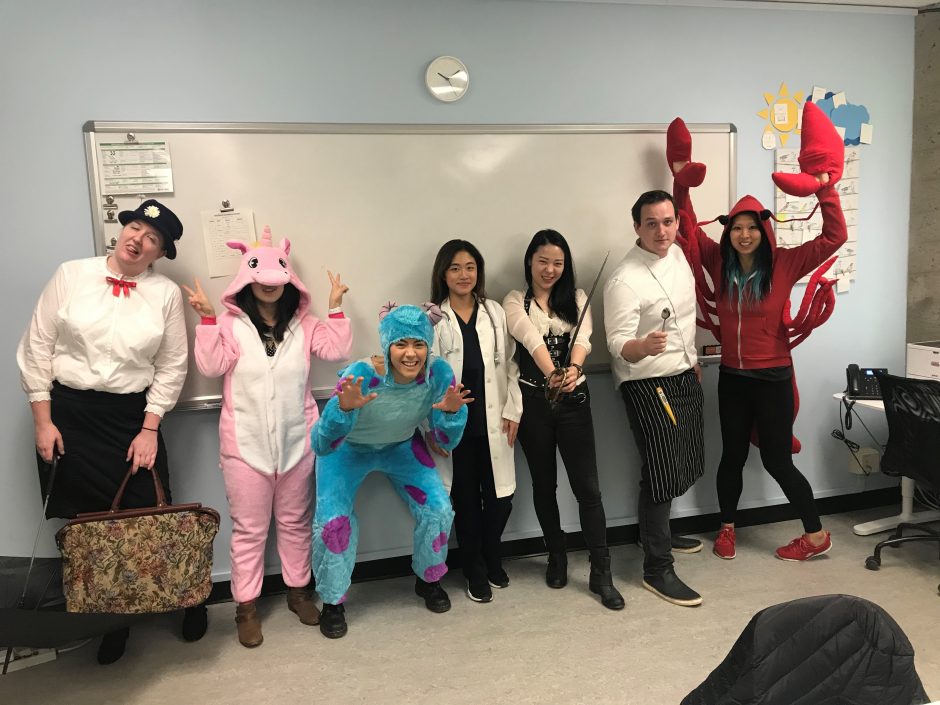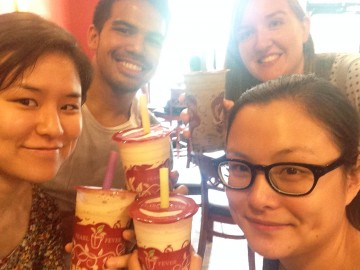
I enjoy providing advising and mentorship to first year UBC students in their transition to university.
From 2012-2017 I was a Faculty Fellow in Jump Start, which is a transition program for incoming UBC undergraduates that occurs right before the start of the academic year. The purpose is to provide a fun, safe, and educational community for students to help them have a successful social and academic transition to university life. I then was the Professor in Residence for Arbutus and Oak Collegia from 2018-2020. This program has similar goals to Jump Start, and runs through the academic year. After taking a break for COVID-19, in 2023 I have returned to being a Faculty Fellow in Jump Start.
As part of my role, among other programming activities I host “boba education” parts 1, 2, and 3 (we learn about bubble tea including how to evaluate it and of course, including taste tests) and “cardio dance time warp” (also known as sweating to the 90s).
Psychology 217 (Thinking Straight about Psychology), University of British Columbia 2011-2014
Psychology 3005 (Statistics and Research Methods I), University of Virginia 2007-2010
Psychology 371 (Intro to Psychological Statistics), San Francisco State University 2004
This course is part of a year-long series covering statistics and research methods that is required for undergraduate psychology majors. I have been an instructor for this course at three different universities with varied demographics, but my experience has been similar: I have immense fun teaching this course because I relish sharing how I find statistics and research methods to be relevant to everyday life. I haven’t taught this course for a long time, though, and currently my teaching focus has been on Psychology 531 which is a graduate class.
Psychology 531 (Clinical Assessment: Applications), University of British Columbia 2011-present
This is a required seminar for first year clinical psychology graduate students which covers administering cognitive and psychopathology clinical assessment tools, interpretation of results, report writing, and providing feedback sessions. Students also learn how to think about how clients’ cultural background may influence their scores and responses, and how their own positionality may influence their interpretations of the clients’ data. These are some of the key skills that graduate students need to learn to become practicing psychologists in the future. As part of this course, the graduate students conduct an assessment with a practice client, who is a participant in the psychology human subjects pool.

Clinical Supervision of Psychology Graduate Students, University of Virginia 2006-2011
University of British Columbia 2012-present
I also serve as a clinical supervisor for graduate student therapists seeing clients. I am strongly committed to interventions, and I enjoy supervising because it helps keep me connected to the diverse clinical needs of families and children.
Psychology 7655 (Seminar in Child Psychopathology), University of Virginia 2006-2010
This is a seminar for graduate students about psychological disorders in childhood and adolescence. I have also taught this course at the undergraduate level. We engage in activities, case studies, and role plays to gain understanding of the causes and manifestations of childhood psychopathology.
Psychology 4500 (Popularity in Childhood and Adolescence), University of Virginia 2009
I was awarded funding from the Mead Honored Professors Program to create this undergraduate seminar (18 students) where we compared the research literature on popularity to experiences depicted in movies such as “Mean Girls”. As a class we hosted a carnival for children with peer problems in order to illustrate the principles described in the research literature that we had read.
Psychology 101 (Introduction to Psychology), University of Virginia 2005-2006
Psychology 001 (Topics in Psychology), University of California at Berkeley 2003
Topics in Psychology, Johns Hopkins University Center for Talented Youth 2001-2003
This lecture course draws students of varied backgrounds who share interest in receiving a basic survey of psychological principles. We engage in demonstrations to illustrate phenomena from multiple areas of psychology, such as biological bases of behavior, cognition, personality, decision and judgment, conformity, developmental milestones, and abnormal behavior.